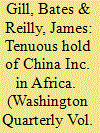|
|
|
Sort Order |
|
|
|
Items / Page
|
|
|
|
|
|
|
| Srl | Item |
| 1 |
ID:
028161


|
|
|
|
|
| Publication |
London, Hutchinson of London, 1975.
|
| Description |
xiii, 313p.
|
| Standard Number |
009120870X
|
|
|
|
|
|
|
|
|
|
|
|
Copies: C:1/I:0,R:0,Q:0
Circulation
| Accession# | Call# | Current Location | Status | Policy | Location |
| 014901 | 327.5106/HUT 014901 | Main | On Shelf | General | |
|
|
|
|
| 2 |
ID:
076852


|
|
|
|
|
| Publication |
2007.
|
| Summary/Abstract |
China’s constructive approach with Africa fits squarely within its global strategy to promote China as a peacefully developing and responsible rising power seeking a harmonious world. China does look to Africa’s resources to fuel China’s growth. More broadly, however, Beijing seems to sense that Africa is on the verge of an economic and political renaissance. It wants to get in on the ground floor and be an integral and valued part of that transformation.
Within that broader strategy, China’s “corporate engagement” strategy in Africa consists of several elements. Top Chinese leaders and diplomats create a favorable environment for Chinese investment in Africa through a mixture of prestige diplomacy, economic assistance, and diplomatic support for African leaders. At home, China’s economic bureaucratic agencies encourage Chinese state-owned enterprises (SOEs) to increase their investment and trade with Africa. China’s SOEs implement Beijing’s aid projects, extract strategic natural resources for export back to China or for profit in the international marketplace, and expand their manufacturing bases in China. Chinese workers staff Chinese projects efficiently and at low cost, and Chinese migrants build trade networks and supply chains linking China and Africa. At least, that is the idea.
Since 2000, this impressive policy push has rapidly advanced China’s core strategic, economic, and diplomatic objectives in Africa. Chinese corporations have secured long-term access to key strategic resources. Economic policymakers have leveraged ties to the continent to build a more globalized network of large transnational corporations. The prospects for economic growth and investment have encouraged African leaders to support China’s broader diplomatic effort to portray itself as a peacefully rising power interested in “win-win” solutions and have helped lure African capitals to drop official ties with Taipei in favor of diplomatic relations with Beijing.
Most analysts, however, tend to exaggerate the prospects of China’s corporate engagement in Africa. As it deepens, the Chinese government will more likely find itself hamstrung by what theorists call a powerful “principal-agent” dilemma: an increasing set of tensions and contradictions between the interests and aims of government principals—the bureaucracies based in Beijing tasked with advancing China’s overall national interests—and the aims and interests of ostensible agents—the companies and businesspersons operating on the ground in Africa.
As China’s Africa strategy depends on an ever-increasing number of bureaucratic principals and corporate agents, contradictions between them will likewise increase. There is already ample and growing evidence of Chinese corporations and entrepreneurs taking steps that are at odds with Chinese government interests, creating problems for Beijing’s attempts to promote a positive and constructive image for Chinese engagement in Africa. Looking ahead, Beijing’s ability to rely on its corporate agents to dependably advance its strategic, economic, and diplomatic interests in Africa will further erode. This in turn will likely present new challenges to China’s global influence and overall soft-power strategy.
|
|
|
|
|
|
|
|
|
|
|
|
|
|
|
|
|
|
|
|
|